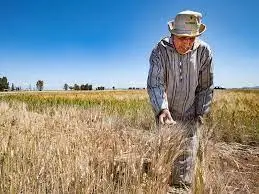No products in the cart.

Exploring the Types of Agricultural Economics
Understanding the Different Types of Agricultural Economics
Agriculture is more than just farming. It’s a complex system that feeds billions of people worldwide. But what drives the economics behind it? Agricultural economics is the study of how societies use resources to produce food and fiber and how these goods are distributed among the population. If you’ve ever wondered about the forces that influence the price of your groceries, or why some countries are food secure while others struggle, this article will dive into those questions and more.
In this article, we will explore the different types of agricultural economics and how they impact our daily lives. Whether you’re someone interested in the environment, a student of economics, or simply curious about how the world works, this guide will provide you with valuable insights.

Table of Contents
Introduction to Agricultural Economics
Imagine a world without agriculture. It’s a scary thought, isn’t it? Agriculture is the backbone of human civilization, and its economic study is crucial to understanding how our society functions. The area of economics that examines the production, distribution, and consumption of agricultural products and services is known as agricultural economics.. But what does that mean for you and me? In simple terms, it’s about understanding how farming impacts our daily lives, from the food on our plates to the clothes we wear.
This article will break down the types of agricultural economics, making complex ideas easy to understand. We’ll explore how different aspects of agricultural economics play a role in shaping our world, from policy to production, and everything in between.
The Basics of Agricultural Economics
Before we dive into the types, let’s cover the basics. Agricultural economics is a field that combines elements of economics, business, and the agricultural sciences. It focuses on optimizing the production and distribution of food and fiber, which includes everything from growing crops and raising livestock to managing natural resources.
Why is Agricultural Economics Important?
Agricultural economics helps us answer essential questions, such as:
- How do we feed a growing global population?
- What policies ensure food security?
- How can farming be both profitable and sustainable?
Understanding these basics sets the stage for a deeper exploration into the different types of agricultural economics.
Types of Agricultural Economics
Agricultural economics is a broad field with various sub-disciplines, each focusing on a different aspect of agriculture. Let’s explore the main types:
Production Economics in Agriculture
Production economics deals with the processes involved in producing agricultural goods. It examines the relationships between input (like seeds, labor, and machinery) and output (crops, livestock, etc.). This branch of agricultural economics is vital for farmers who need to optimize their resources to maximize profits.
- Key Focus Areas: Resource allocation, cost management, and efficiency.
Agricultural Policy and Development Economics
This type examines how government policies affect agriculture. Agricultural policy economics involves the creation, analysis, and application of policies that impact the agricultural sector. It includes subsidies, trade regulations, and rural development programs.
- Key Focus Areas: Policy impact, rural development, and international trade.
Agricultural Finance and Risk Management
Agricultural finance is concerned with the financial aspects of farming, including credit, investment, and risk management. This field is crucial for ensuring that farmers have the resources they need to sustain their operations and manage the risks inherent in agriculture, such as weather conditions, price fluctuations, and market changes.
- Key Focus Areas: Credit, investment, insurance, and risk assessment.
Natural Resource Economics
Agriculture heavily relies on natural resources like land, water, and air. Natural resource economics focuses on the sustainable use and management of these resources. This type of agricultural economics helps in understanding the long-term impacts of farming on the environment and finding ways to use resources more efficiently.
- Key Focus Areas: Sustainable resource use, conservation, and environmental impact.
Environmental Economics in Agriculture
Closely related to natural resource economics, environmental economics in agriculture looks at the environmental consequences of farming activities. It’s about finding the balance between agricultural productivity and environmental health.
- Key Focus Areas: Pollution control, sustainable practices, and environmental policies.
Agricultural Marketing and Trade
Once agricultural products are produced, they need to be marketed and sold. Agricultural marketing economics examines how these products are distributed and traded in local and global markets. This type helps in understanding the factors that influence pricing, demand, and supply of agricultural goods.
- Key Focus Areas: Market analysis, pricing strategies, and trade policies.
Labor Economics in Agriculture
Labor is a critical component of agricultural production. Labor economics in agriculture studies the workforce involved in farming, including issues related to wages, working conditions, and labor supply and demand.
- Key Focus Areas: Labor market dynamics, wage determination, and employment trends.
Food Economics and Consumer Behavior
This type of agricultural economics looks at the end of the agricultural supply chain – the consumers. Food economics examines how consumers make decisions about the food they buy and consume. It also explores the economic factors that influence consumer behavior, such as price, income, and cultural preferences.
- Key Focus Areas: Consumer preferences, food pricing, and consumption patterns.
The Role of Technology in Agricultural Economics
Technology has revolutionized agriculture, from the invention of the plow to the use of drones in modern farming. Technological economics in agriculture explores how innovations impact productivity, efficiency, and sustainability.
- Key Focus Areas: Technological adoption, innovation, and impact on productivity.
Sustainable Agriculture and Economics
Sustainability is a growing concern in agriculture. Sustainable agricultural economics focuses on practices that maintain productivity while preserving the environment and natural resources. This type of economics emphasizes the long-term health of the agricultural sector.
- Key Focus Areas: Sustainable practices, economic viability, and environmental stewardship.
Conclusion: The Future of Agricultural Economics
As we look to the future, agricultural economics will play an increasingly vital role in addressing global challenges like food security, climate change, and sustainable development. Understanding the different types of agricultural economics helps us appreciate the complexities of the agricultural sector and the importance of making informed decisions for the future of our food systems.
Agricultural economics is not just about numbers and policies; it’s about people, communities, and the planet. Whether you’re a farmer, a policy-maker, or a consumer, the principles of agricultural economics impact your life every day. By understanding these principles, we can work together to build a more sustainable and equitable world.
FAQs
1. What is agricultural economics?
Agricultural economics is the study of how societies use resources to produce and distribute food and fiber. It combines elements of economics, business, and agricultural sciences to optimize the production and distribution of agricultural goods.
2. Why is agricultural economics important?
Agricultural economics is important because it helps us understand how to feed a growing global population, ensure food security, and develop sustainable farming practices. It also informs policy decisions that impact the agricultural sector.
3. What are the main types of agricultural economics?
The main types of agricultural economics include production economics, agricultural policy and development economics, agricultural finance and risk management, natural resource economics, environmental economics, agricultural marketing and trade, labor economics, food economics, and technological economics.
4. How does agricultural policy impact the economy?
Agricultural policy impacts the economy by influencing food production, prices, and trade. Policies like subsidies, trade regulations, and rural development programs can significantly affect the agricultural sector and the overall economy.
5. What role does technology play in agricultural economics?
Technology plays a crucial role in agricultural economics by improving productivity, efficiency, and sustainability. Innovations like precision farming, drones, and biotechnology have revolutionized modern agriculture, making it more productive and environmentally friendly.
Go and turn on towards organic farming to save future and thire save childs:
Elevate Plant Growth with Premium Bone Powder – Buy Now!
Organic Cow Dung Compost: Transform Your Garden Naturally
Premium Humic Acid for Healthy Plants | Enhance Soil & Boost Growth
Boost Plant Growth Naturally with Mustard Cake | Organic Fertilizer
Transform Your Garden with NPK Fertilizer | Boost Growth by 30%
Premium Perlite for Enhanced Gardening | Buy Now
Live Earthworms with Enhance Your Garden (soil health)
1 Neem Khali: Unveiling the Wonders of Nature
1Transform your garden with vermiwash-buy now
1 Premium quality Vermicompost [ केचुआ खाद ]
Follow us:


